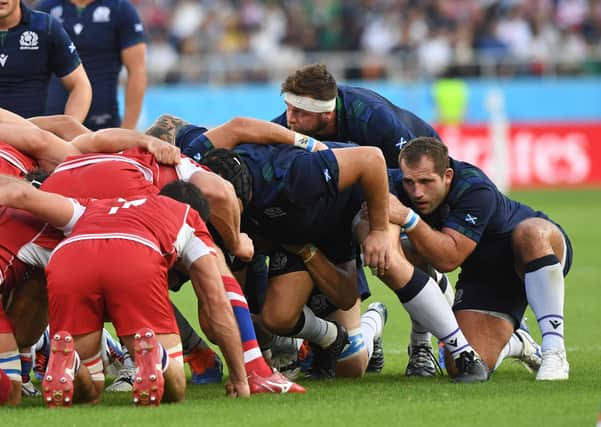New rugby rules: No scrum resets or choke tackles to cut virus risk


World Rugby’s executive committee has approved optional law trials that provide member unions with measures to help reduce the risk of Covid-19 transmission.
New Zealand is set to lead the way in the middle of next month with a ten-week competition between its Super Rugby teams which will come with restrictions but played under the normal laws.
Advertisement
Hide AdAdvertisement
Hide AdFor other parts of the world, not least our own, that is not currently possible and the global governing body has now approved a list of ten optional law changes, as well as other suggestions on safety and hygiene as the sport desperately tries to get back up and running as soon as it possibly.
Under the World Rugby guidance, unions can apply to implement one or more of the temporary law amendments as domestic trials in line with the governing body’s return to play guidance.
A World Rugby statement said the trials “provide limits to scrum options with no scrum resets, limits for players joining rucks and mauls, time to play the ball at the base of scrums and rucks reduced from five to three seconds and only one movement permitted for a maul.”
The trials, which World Rugby said were “underpinned by World Health Organisation guidance”, were considered by a specialist Law Review Group consisting of coaches, players, match officials, medics and law specialists following detailed analysis of 60 matches.
World Rugby say the ruck and maul measures could “reduce contact exposure for tight five players by more than 30 per cent, reduced exposure at the ruck by up to 25 per cent and reduce maul exposure by 50 per cent.”
World Rugby chairman Sir Bill Beaumont said: “The health and well-being of the rugby family is paramount.
“We have extensively evaluated the perceived risk areas within the game in partnership with our unions. This has enabled an evidence-based assessment of risk areas and playing positions, which led us to develop optional temporary law amendments.”
In addition to the on-field law trials, a number of hygiene measures are recommended for playing and training.
Advertisement
Hide AdAdvertisement
Hide AdThese include mandatory hand and face sanitisation pre- and post-match, regular sanitisation of the match ball before during and after matches, single-use water bottles, changing kit at half-time, regular ball sanitisation, prevention of huddles and celebrations, prevention of spitting and nose clearance.
Beaumont added: “We have extensively evaluated the perceived risk areas within the game in partnership with our unions.”
Scrum re-sets, which happen an average 3.5 times per game according to World Rugby, are being advised to removed when no infringement occurs. Instead, there would be a free-kick to the team which put the ball into the original scrum.
There will be no scrum option for a penalty or free kick, and there will be a goal-line dropout when an attacker is held up in-goal. As for mauls, no player is allowed to join one if not in it at the start, and only one forward movement is allowed.
At rucks, referees will ask players to release the ball after three seconds instead of the current five.
World Rugby is also pushing to remove choke tackles, which are when two or more defenders tackle an attacker and prevent him from releasing the ball, and for players to tackle opponents lower because of the reduced transmission rate compared to upright tackling. Sin-bins will increase by five minutes to 15.
In New Zealand, which has limited the number of confirmed cases of Covid-19 to 1,154 and known deaths to 21, and their domestic Super Rugby tournament featuring Auckland Blues, Waikato Chiefs, Wellington Hurricanes, Canterbury Crusaders and Otago Highlanders is set to begin on 13 June.
“There doesn’t appear to be any signs of community transmission in New Zealand so we don’t anticipate the need to adopt the law proposals,” New Zealand Rugby chief executive Mark Robinson said earlier this week.
Advertisement
Hide AdAdvertisement
Hide Ad“We have been open with World Rugby about this and they understand our unique situation.”
The situation is different in Europe and North America.
The Guinness Pro14, which involves Scotland’s pro-teams Glasgow and Edinburgh remains suspended, rugby is unlikely to return in Ireland for several months and the English top division has yet to announce when it will be resuming.
A message from the Editor:
Thank you for reading this story on our website. While I have your attention, I also have an important request to make of you.
With the coronavirus lockdown having a major impact on many of our advertisers - and consequently the revenue we receive - we are more reliant than ever on you taking out a digital subscription.
Subscribe to scotsman.com and enjoy unlimited access to Scottish news and information online and on our app. With a digital subscription, you can read more than 5 articles, see fewer ads, enjoy faster load times, and get access to exclusive newsletters and content. Visit https://www.scotsman.com/subscriptions now to sign up.
Our journalism costs money and we rely on advertising, print and digital revenues to help to support them. By supporting us, we are able to support you in providing trusted, fact-checked content for this website.
Joy Yates
Editorial Director
Comments
Want to join the conversation? Please or to comment on this article.